Dentures – Garland, TX
Seamlessly Replace the Gaps in Your Smile
Missing some or all of your teeth can affect more than just your appearance – it can affect your quality of life as well. Fortunately, you don’t have to live that way forever. At North Garland Family Dental, we can rebuild your smile and restore your self-confidence with dentures. In fact, about 40 million Americans already wear full or partial dentures. Will you be next? To learn more about dentures in Garland, continue reading or reach out to us to schedule a consultation today!

Why Choose North Garland Family Dental for Dentures?
- Implant Dentures Available
- Custom-Made for Natural-Looking Results
- Insurance-Friendly Dental Practice
Who’s a Good Candidate for Dentures?

Dentures can be life-changing for patients struggling with missing teeth. They’re an excellent way to restore your ability to chew, speak, and smile with confidence—especially if you’re in need of a complete solution. At North Garland Family Dental, we provide quality dentures for patients of all ages who need an affordable, effective way to improve their oral health and quality of life. Whether you’re missing a few teeth or an entire arch, dentures could be perfect for you! But how do you know if they’re the right fit? Read more below to see the qualities we look for in great denture candidates.
Effects of Missing Teeth

Missing teeth are more than an inconvenience, they can affect your appearance and harm your oral health in many ways, such as:
- Difficulty Eating: Missing teeth make it harder to chew, limiting your diet and the nutrients you have on a regular basis.
- Speech Challenges: Gaps in your smile can cause slurring, whistling, mumbling, and other speech challenges, often leading to frustration.
- Bone Loss: One of the jobs of tooth roots is to stimulate your jawbone. When teeth are missing, the bone can shrink over time.
- Shifting Teeth: Surrounding teeth may drift into gaps, creating alignment problems, jaw pain, and even headaches.
At our Garland office, we understand the importance of replacing missing teeth to prevent these issues. Dentures are a practical, effective way to restore your smile and protect your oral health.
What Are the Qualities of a Great Candidate for Dentures?

Almost anyone can get dentures if they need them because they’re so adaptable. However, some patients are better candidates than others, often sharing some key qualities, including:
- Missing Multiple Teeth: Whether you’re missing several teeth or an entire arch, dentures can help.
- Healthy Gums: Good oral health is necessary for a stable and comfortable fit for your prosthetics.
- Commitment to Care: Once you have dentures, they’ll need consistent maintenance including daily cleaning and regular trips to our office for evaluation.
- Need for Affordability: Dentures are often cheaper than other tooth replacement options, making them a great fit for patients on a tight budget.
Alternative Tooth-Replacement Options
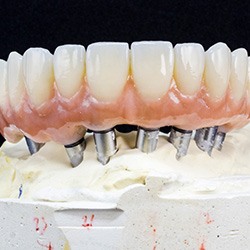
Dentures aren’t the only solution for missing teeth. At North Garland Family Dental, we offer several alternatives that can be tailored to your unique needs:
- Dental Bridges: These are fixed prosthetics made up of two dental crowns and one or more false teeth called pontics. This option is ideal for patients missing one or a few teeth in a row.
- Dental Implants: Known as the gold standard of tooth replacements, this long-term treatment uses restorations like crowns attached to titanium fixtures that are directly inserted into your jawbone. These mimic natural teeth in many ways, staying stable and stimulating your jawbone to prevent resorption.
Each option has its own benefits and considerations. During your consultation, we’ll help you explore the best tooth-replacement solution for your smile and lifestyle!
Types of Dentures

The first step on your journey towards a rebuilt smile is a consultation with our team at North Garland Family Dental. We’ll explain a few different types of dentures that are available and how they cater to the unique needs of each patient. Based on your evaluation, we’ll recommend one of the following:
Partial Dentures
Do you still have some remaining teeth? A partial denture may be the ideal solution for you. It has an acrylic or metal base and is designed to fill in the gaps between your teeth perfectly. Small clasps attached to your remaining natural teeth will hold your restoration firmly in place, allowing you to enjoy a complete, fully functioning smile.
Full Dentures
If you’re missing an entire arch of teeth, full dentures may be right for you. Like partials, they have a discreet, gum-colored base and lifelike prosthetic teeth. However, full dentures are held in place by the shape and suction of your gum tissue.
Implant Dentures
Implant dentures are a sturdier, more long-lasting option to replace your missing teeth. They hold your denture in place with titanium posts that are surgically inserted into the jawbone to mimic natural tooth roots. Once the implants fuse with the surrounding bone tissue via osseointegration, they’ll provide maximum stability and prevent bone loss from occurring over time.
How Dentures are Made

Before you get them, you may want to learn how dentures are made. That’s a common concern – many patients like knowing what went into their replacement teeth. As for how to address it, North Garland Family Dental will gladly share the facts of denture creation with you. Our helpful summary should give you a sense of how your new teeth came to be! So, please keep reading or call us directly to learn the details.
What are Dentures Made Of?
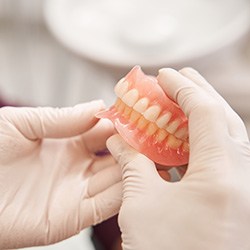
Regardless of type, every denture has a base and artificial teeth. These two parts are crucial to the whole device, so it’s worth your time to consider them closely. Please learn about them below:
- Denture Base – The base of a denture is its foundation, the part that keeps the artificial teeth secure. It’s usually made of pink-colored acrylic, though other materials like nylon can serve as good substitutes.
- Artificial Teeth – Per their name, the artificial teeth are a denture’s tooth-replacing parts. Dental labs make them from resin or porcelain to match your smile’s color.
The Denture Creation Process
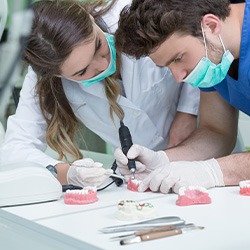
Making a denture involves a multi-step process, as each device is custom-made for its patient. The relevant steps include:
- Step 1: Our dentists will use a dental impression to design a plaster model, which will be made to match your final denture’s size and shape.
- Step 2: The model will be sent to a dental lab and used to make a wax gumline based on your grin.
- Step 3: When the wax gumline is ready, workers will set artificial teeth in it. They’ll then have made a prototype denture.
- Step 4: Once we receive the prototype, our practice will check it against your mouth. We’ll then send it back when we’ve confirmed its fit.
- Step 5: After boiling it to remove wax, a worker will place the prototype in a flask. They’ll apply plaster to the flask and have it sit in hot water.
- Step 6: A separator will go into the plaster layer, keeping the acrylic from sticking. This acrylic will be injected into the flask to replace the wax.
- Step 7: The dental lab will remove all plaster to reveal the final denture. Then, they’ll place the restoration in a bath to remove its residue.
- Step 8: The lab’s workers will remove your denture’s excess acrylic and polish its surface.
- Step 9: To ensure it works smoothly and easily, our office will fit your final denture for you.
Adjusting to Your New Dentures

Your mouth will likely feel sore as you adjust to your dentures; you’ll need time to get used to them. That said, this symptom is temporary and should quickly fade. The dentures will feel more familiar as you practice with them over time.
Of course, you can speed up the adjustment process. One method would be to exercise your facial muscles; you’d then have a mouth strong enough for dentures. Similarly, you could eat soft foods to avoid irritated gums or use special adhesives for security.
Should the pain from adjustment persist, please call our office. There’s a chance your denture needs more alterations to its fit.
The Benefits of Dentures

If you’re missing multiple teeth, it can be difficult to do everyday activities like eating, speaking clearly, and even sharing your smile with the world. Replacing your missing teeth with the help of dentures can vastly improve your quality of life. If you’re missing several, most, or all of your natural teeth, dentures can restore your smile and provide many benefits to your oral and overall health. Here are just a few benefits to using these prosthetics.
Psychological Benefits

When you’re missing multiple teeth, it can take its toll on your emotional health and well-being. These insecurities could cause you to withdraw socially, or even feel sad or depressed. In fact, studies have shown that patients who are self-conscious about missing teeth are much less likely to engage in social activities due to poor self-esteem.
Conversely, when you restore your smile with the help of dentures, you are more likely to experience a boost in self-confidence. This can benefit you by helping to alleviate anxiety about your appearance, speech articulation, and your ability to chew food during social engagements.
Clearer Enunciation

Missing teeth can make it harder for you to properly enunciate your words when you speak. This is because your lips and tongue need to be properly positioned to pronounce certain sounds. Thus, when you cannot touch your tongue to your teeth, it can be very difficult to speak clearly.
Dentures replace those missing teeth that are causing speech problems, and after a short adjustment period will once again allow you to enunciate properly.
Improves Nutrition

Healthy foods like fresh fruits and vegetables as well as some proteins can be difficult to eat when you can’t chew properly. Thus, when you are missing teeth, it can be difficult to get adequate nutrition. This can lead to digestion issues and malnourishment.
Dentures improve your ability to chew, enabling you to eat a more nutritious diet and helping your body receive essential nutrients to stay healthy for a lifetime.
Preserves Oral Health

If you still have any remaining natural teeth, your dentures can help preserve them by preventing them from shifting to other areas of your mouth. Furthermore, because they are strong and durable, your dentures can alleviate some of the weight of regular chewing from those natural teeth and help protect them from wear and tear.
Expands Opportunity

Your smile is your calling card, and one of the very first things people notice about you. From job interviews to important presentations and even in your social life, having a healthy, beautiful smile gives you a competitive edge. In fact, a 2019 study found that people with poor oral health were less likely to be employed than those with healthier teeth and gums. Restoring your smile with the help of dentures can give you a boost of confidence that could help increase your opportunities in many areas of your life.
Understanding the Cost of Dentures

If you have concerns about the cost of dentures in Garland, you’re not alone. At North Garland Family Dental, we strive to keep them affordable for everyone. The amount you will pay is determined by your specific needs, like how many teeth you’re missing. We’ll provide you with a personalized estimate and review your payment options to keep a complete smile within your budget.
Factors That Affect the Cost of Dentures

There isn’t a one-size-fits-all denture because everyone’s mouth is unique, just like fingerprints. Therefore, various factors affect their cost, such as:
- Preparatory Treatments: It’s not unusual to require a little prep-work before getting your denture, like tooth extractions, gum disease treatment, or gum grafting.
- Number of Teeth: The number of teeth you’re replacing will influence the cost, as well as if you’re treating one or both arches.
- Type of Denture: Besides traditional partials and dentures, you can also choose from implant-supported options.
- Materials: You’ll find discounted materials, but keep in mind, you’ll get what you pay for.
Although everyone likes to save money, don’t pinchpennies when investing in dentures in Garland. It’s best to focus on quality to ensure your new smile serves you for many years.
Are Implant Dentures More Expensive?

Implant dentures cost more upfront than traditional prosthetics, but they are the most cost-effective because they can last for decades. You won’t have to budget for new teeth every few years. You’ll also benefit from lower oral health expenses because implant dentures will keep your jawbone strong to avoid common issues caused by tooth loss, like gum disease. While they may have a higher price tag, budgeting for implant dentures can be easier because you don’t have to come up with a lump sum. The process is performed in multiple steps with separate fees, so you can pay as you go.
Does Dental Insurance Cover Dentures?

Most dental insurances can be used to offset the fees for certain steps in your treatment plan, like the consultation with your denture dentist in Garland. After meeting your deductible, you can use your annual allowance to pay up to 80% of specific services until reaching your yearly limit. We know dental insurance is confusing, but we are here to help. We will file the required forms to maximize any applicable coverage, so you have one less thing on your plate.
Other Options for Making Dentures Affordable

Besides using dental insurance, we offer multiple financial solutions to accommodate your budget. We will review each option during your consultation, which includes:
- Traditional Payments: We accept all forms of traditional payments, including cash, checks, and credit cards.
- Special Offers: Ask us about any current special offers.
- Third-Party Financing: Pay for your new smile using monthly installments through a third-party financing company, like CareCredit.
If you have any questions about paying for dentures, or you’re ready to replace your lost teeth, contact our office today. We look forward to restoring the beautiful, functional smile you deserve.
Dentures Aftercare

When it comes to enjoying life with your new dentures, you must be committed to taking proper care of them. To do this, you need instructions from a trusted dentist who can help. At North Garland Family Dental, our team of experts is here to provide tips that are designed to keep your new smile looking its best, functioning well, and lasting for years to come.
Removable Dentures
Remove After Eating

Your dentures may be durable enough to withstand normal chewing and eating, but they need thorough cleaning once you have finished a meal. Bacteria and food particles can easily become trapped beneath the prosthetic, resulting in irritation to your gum tissues.
By cleaning and rinsing them after eating, you can be sure that your mouth remains free of harmful bacteria.
Clean Your Restoration
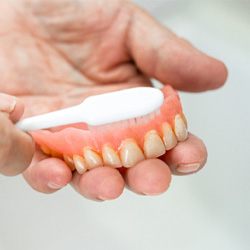
When it comes to cleaning your restoration, you need to make sure you have the appropriate tools. This not only includes a soft-bristled toothbrush, but you may need a denture cleaner, non-abrasive toothpaste, dental floss, and an ADA-approved mouthwash.
Similar to your natural teeth, your dentures need to be cleaned regularly. Typically, you will want to do this in the mornings and at night as well as after every meal.
Keep Your Dentures Safe
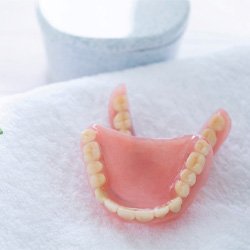
Artificial teeth are designed to be sturdy; however, they are not indestructible. Pets and children can easily cause damage to your new smile if you’re not careful. Making sure that you place your teeth in an area that cannot be easily reached is essential. Also, when preparing to clean your dentures, lay a towel in the basin of your sink so that they do not break should you accidentally drop your teeth.
Remove Dentures When You Sleep
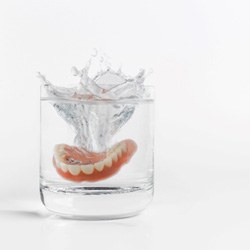
Wearing dentures requires much restriction. Your gums and bone are subject to the pressure that dentures apply each day, so when it comes time to go to bed, these portions of your mouth need time to breathe.
This is why it’s essential that you allow your dentures to soak overnight in a denture cleaner. Not only does this ensure that bacteria and other harmful particles are removed, but it also gives your soft oral tissues and bone a chance to retrieve valuable nutrients that are lost throughout the day.
Notice Changes
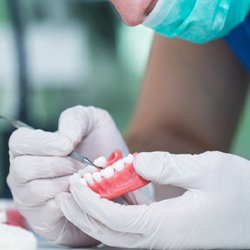
It is normal for denture wearers to experience changes in their facial structure over time. If you notice that your teeth no longer fit as comfortably as they did before, don’t wait to schedule an appointment. Call our office to inquire about relinement or replacement. Depending on the level of change, we may need to discuss having a new denture created. We can also go over the possibility of switching to an implant denture if that is something you would like to consider.
All-On-4 Dentures
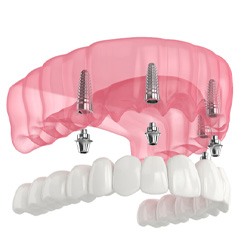
All-On-4 dentures are a more permanent and longer-lasting form of tooth replacement. However, they, too, need adequate cleaning and care. Whether you have a removable or fixed denture, cleaning beneath the prosthetic to ensure that bacteria do not gather around the gumline is important. Using a soft-bristled toothbrush, dental floss, and mouthwash can help remove bad oral bacteria and food particles, keeping your new teeth in the best possible shape day after day.
Dentures FAQs
Should I Have All My Teeth Pulled to Get Dentures?
Repairing a damaged tooth whenever possible will always be preferable to replacing it. Tooth extractions of any kind will only ever be recommended if deemed absolutely necessary, like when a tooth is too damaged to save thanks to extensive decay, severe infection, or trauma. If all of the teeth in an arch are decayed or infected with gum disease, replacing them with dentures may be a viable option, but your dentist will always explore all of your options before recommending extractions for dentures.
Can I Sleep with My Dentures?
Dentists generally recommend that you take your dentures out at night when you go to bed. When you first get dentures, you will likely be told to keep them in your mouth for 24 hours, including when you sleep. After this, you should be taking them out each evening. This is because dentures restrict the circulation in the gums, leading to soft-tissue irritation and potentially speeding up ridge resorption. Taking your dentures out at night gives your gums a chance to recover and get the nutrients they need during the night.
Will It Hurt to Get Dentures?
If you need to have teeth extracted before you can get dentures, you may experience some discomfort after the oral surgery. Take your prescribed medication as directed, and the discomfort should improve 3 to 5 days after the procedure. When you first receive new dentures, some minor irritation may occur while your mouth adjusts to the new appliance. The amount of time that this lasts varies from person to person. If discomfort persists, give us a call so we can help!
Is It Hard to Talk with Dentures?
When you first get dentures, it will take some time to get used to speaking with them since you’re so used to sleeping with your natural teeth. The exact amount of time it takes to get used to speaking with dentures will vary from person to person, but generally speaking, the more your practice, the faster the adjustment process goes. Read out loud to yourself and repeat difficult-to-pronounce words. Speak slowly at first, as fast speech can sound muffled when you aren’t quite used to your dentures yet.









